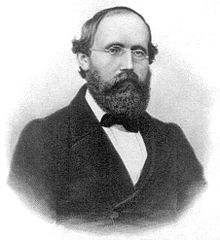
Back Bernhard Riemann Afrikaans Bernhard Riemann AN برنارد ريمان Arabic برنارد ريمان ARZ বাৰ্নহাৰ্ড ৰিমান Assamese Bernhard Riemann AST Bernhard Riman Azerbaijani برنهارت ریمان AZB Георг Фрыдрых Бернхард Рыман Byelorussian Бэрнгард Рыман BE-X-OLD
This article includes a list of general references, but it lacks sufficient corresponding inline citations. (November 2020) |
Bernhard Riemann | |
|---|---|
 Riemann c. 1863 | |
| Born | Georg Friedrich Bernhard Riemann 17 September 1826 Breselenz, Kingdom of Hanover (modern-day Germany) |
| Died | 20 July 1866 (aged 39) |
| Alma mater | |
| Known for | See list |
| Scientific career | |
| Fields | |
| Institutions | University of Göttingen |
| Thesis | Grundlagen für eine allgemeine Theorie der Funktionen einer veränderlichen complexen Größe (1851) |
| Doctoral advisor | Carl Friedrich Gauss |
| Other academic advisors | |
| Notable students | Gustav Roch Eduard Selling |
| Signature | |
Georg Friedrich Bernhard Riemann (German: [ˈɡeːɔʁk ˈfʁiːdʁɪç ˈbɛʁnhaʁt ˈʁiːman] ⓘ;[1][2] 17 September 1826 – 20 July 1866) was a German mathematician who made profound contributions to analysis, number theory, and differential geometry. In the field of real analysis, he is mostly known for the first rigorous formulation of the integral, the Riemann integral, and his work on Fourier series. His contributions to complex analysis include most notably the introduction of Riemann surfaces, breaking new ground in a natural, geometric treatment of complex analysis. His 1859 paper on the prime-counting function, containing the original statement of the Riemann hypothesis, is regarded as a foundational paper of analytic number theory. Through his pioneering contributions to differential geometry, Riemann laid the foundations of the mathematics of general relativity.[3] He is considered by many to be one of the greatest mathematicians of all time.[4][5]
- ^ Dudenredaktion; Kleiner, Stefan; Knöbl, Ralf (2015) [First published 1962]. Das Aussprachewörterbuch [The Pronunciation Dictionary] (in German) (7th ed.). Berlin: Dudenverlag. pp. 229, 381, 398, 735. ISBN 978-3-411-04067-4.
- ^ Krech, Eva-Maria; Stock, Eberhard; Hirschfeld, Ursula; Anders, Lutz Christian (2009). Deutsches Aussprachewörterbuch [German Pronunciation Dictionary] (in German). Berlin: Walter de Gruyter. pp. 366, 520, 536, 875. ISBN 978-3-11-018202-6.
- ^ Wendorf, Marcia (2020-09-23). "Bernhard Riemann Laid the Foundations for Einstein's Theory of Relativity". interestingengineering.com. Retrieved 2023-10-14.
- ^ Ji, Papadopoulos & Yamada 2017, p. 614
- ^ Mccleary, John. Geometry from a Differentiable Viewpoint. Cambridge University Press. p. 282.